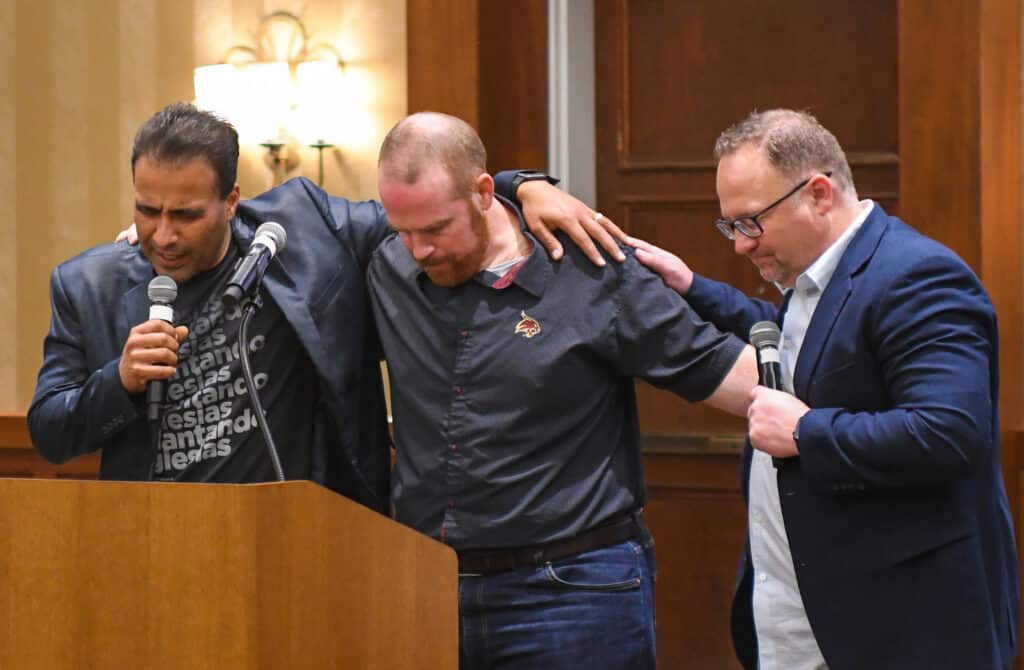For the past four decades, hitting a fever pitch in the 1980s and ‘90s, churches have experienced seismic changes as a result of what has been dubbed the “worship revolution,” or more cynically, “worship wars.” Typically situated along generational fault lines, well-intentioned discussions centered on dichotomies such as hymns vs. choruses, choirs vs. praise teams, and orchestral instruments vs. band equipment.
As the dust has mostly settled, churches can now look back and see both positive and negative trends that emerged as a result. None can deny that the landscape of musical worship in churches has diversified, as churches seek to move beyond the worship wars.
The TEXAN spoke with several music ministers and worship leaders to get a lay of the land and to identify ways music in congregational worship can best glorify God.
The Purpose of Music in Worship
From Old Testament narratives to the Psalms to New Testament instructions on worship, Scripture is clear that music should be an integral part of how the people of God praise and glorify him. Each of the worship leaders interviewed agreed that music is “the universal language,” a gift from God that brings people together in unison.
“There’s something powerful about the way music moves us, changes us and motivates us,” said Michael Armstrong, worship and family pastor at The Well in Argyle.
Likewise, Curtis Brewer, associate pastor of worship & celebration at First Baptist Church in Odessa, spoke of the emotional range that music evokes.
“It is unbelievably powerful—it can be so intimate and tender, and at the same time it can be massive, like an army,” Brewer said. “What can really touch the heartstrings of the people are the experiences that you can sense through the beauty of the music, regardless of genre.”
Used rightly, music can bring unity to the corporate worship experience, according to James Ervin, minister of music at Coggin Avenue Baptist Church in Brownwood.
At the same time, Ervin said, “Music can be used to teach or remind us of the great truths of the Christian faith. It can express our adoration of God, Jesus and the Holy Spirit. Music can and should focus our hearts and minds on the object of our praise—God.”
Brad Jett, worship pastor at North Richland Hills Baptist Church, also noted the way musical worship can help church members learn and remember God’s Word.
“Songs are the greatest memorization tool in the history of the Christian faith,” Jett said. “In worship services, we must sing songs that come from Scripture. Then our congregation members will have God’s Word in their hearts.”
And, leaders said, it’s this foundation in the Scriptures and the preached Word that music helps amplify.
“I will be the first to say that the most powerful thing in our church in Odessa, and I hope it would be in every church, is the gospel of Christ through the spoken word,” Brewer said. “But it’s also important that we’re singing it. When we sing scripturally correct music that is not watered down, it’s going to touch the heartstrings and move the people.”
Echoes of the Worship Wars
Given music’s emotional impact and essential nature in worship, it comes as no surprise that major changes during the worship revolution have produced both advances and casualties.
Positively, these changes brought about more diversity in musical genres and ignited a new generation of worship songwriters. At the same time, it caused churches to “re-evaluate the future of music ministry,” Ervin said.
Lance Beaumont, music and worship technology associate for the Southern Baptists of Texas Convention, agreed. “Worship has come to the forefront as a topic of conversation in staff and leadership meetings.”
Armstrong, who started leading worship in the ‘90s, said the new songs produced a greater focus on the “vertical” nature of worship. Whereas hymns often have more of a horizontal perspective, where Christians sing to one another about God, these newer songs included a vertical perspective, where Christians sing directly to God.
Sadly, though, not everything about this shift was positive. Several interviewed noted an overemphasis on style and preference along with unhealthy communication and sinful attitudes, which sparked discord and disunity in a majority of churches. Additionally, many of the new worship songs lacked the theological depth found in hymns, and worship music became a commodity for the Christian marketplace.
Leo Day, dean of the School of Church Music at Southwestern Baptist Theological Seminary in Fort Worth, travels extensively to churches across the nation to teach and lead worship. One byproduct of the worship wars he has witnessed is the emergence of “silo worship,” where churches offer separate worship services based on musical preferences.
“The enemy has subtly and grandly separated the church body, and nowhere in Scripture will you find that Jesus wants all of his people divided into these different segments of worship so they can ‘really worship him freely.’ In fact, it’s the very opposite of what the Word encourages us to do,” Day said.
Day believes this unintentional elevation of preference has promoted a spectator mentality and brought with it a spiritual coldness in many churches.
“It has made their hearts cold. Why? Because at the heart of it, God created us for fellowship. He created us to corporately worship together, not apart.”
Brewer, who has led music in churches for more than 45 years (34 of them at FBC Odessa), has seen the massive changes in the corporate worship experience over the years. He said he has been blessed with a church that was “open and willing to try what the new generation might be wanting.” Still, he always maintained a healthy balance between musical styles.
“Our older adults paved the way for us to get here, and I think it’s such a tragedy that churches split because of the style of worship,” Brewer said. “If we can just remember who it’s all about—it’s not about us. Remember that it’s all about Jesus, and if it reaches people, let’s give it a try. But at the same time, we must disciple people when we get them in, and not only is that done through the Word, but also musically.”
Each of those interviewed agreed that many churches are recovering from the painful experiences of the worship wars and charting new courses in worship with more Christ-centered, congregationally sensitive approaches.
“Introducing a new style of music to our churches had its time of growing pains, which still lingers in many churches,” Jett said, “but the overall benefit has been the molding together of different styles of music and therefore different generations of people.
The Heart of Worship
Refocusing on the purpose for music worship—to praise God and build up his church—will help recalibrate church members’ hearts, these leaders said.
“I believe that a church’s responsibility is to connect people with God, not connect people with music,” Armstrong said. “Music is a tool. Paint him beautiful, and a true follower of Christ should see the beauty, regardless of the style. … Worship is about what we give him, not what we get.”
Similarly, Day said that as he trains future worship leaders at the seminary, he challenges them to focus on their heart and their personal walk with the Lord.
“It’s not about the songs, it’s not about the sheet music; it’s about the heart,” Day said.
Connecting With All Generations
Ultimately, the greatest worship experiences occur when church members of all ages and backgrounds celebrate God together through a variety of musical styles and genres. Thus, these ministers agree, a blended musical approach provides a healthy diet for the church.
“Embracing the music that helped found our churches, as well as being open to move on and embrace the new is where we will find peace and growth within our churches,” Jett said.
Brewer considers the trend toward cross-generational music to be one of the best things happening in churches today. In his own church, he regularly combines youth and adult choirs during Sunday morning worship.
“The excitement that the kids bring to the worship experience has caused the adults to jump right in and have fun with them, and at the same time, when we can turn the tables on the kids where they can sense the power of music that has a little more meat on the bones, they jump in with it as well. I think that is the beauty and one of the secrets to keeping our churches strong congregationally.”
A multi-generational approach has practical implications, including how worship ministers select the songs to sing. Here, worship leaders are encouraged to introduce new songs to their congregations but to do so patiently, not introducing too many at one time.
“It’s important for people to participate in singing,” Ervin said, “so we must balance our efforts to introduce new songs; make sure they are singable, in appropriate ranges, and theologically correct.”
Meeting all these criteria can be challenging but ultimately prove fruitful in unifying a congregation around worship through music.
“The future of worship in the local church, in my view, lies in the “multis”—multi-generational worship and multi-ethnic worship,” Beaumont said. “Worship leaders need to know how to select music that will engage all age groups within the church utilizing styles that are inclusive as well. Additionally, worship leaders need to understand how different ethnic groups engage with music and their cultural contexts.”
Regardless of the challenges that come, Brewer said leading the church in worship through music has been one of the greatest joys of his life.
“If God’s in it, and you sell out to it, it’s the most phenomenal experience that you’ll have on the face of the earth, this side of heaven only,” Brewer said, adding, “I wouldn’t trade it for the world.”














